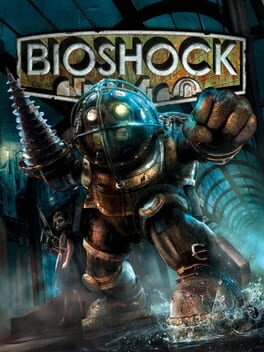The art direction in BioShock is incredible. The setting of Rapture, the fallen anarcho-capitalist paradise whose ruins we trawl and scavenge through in a desperate fight for survival, is instantly gorgeous, recognizable, and distinct. This is good, because BioShock is in all other respects stale and unremarkable. Everything BioShock does has been done better before and since, including by some of the very people who worked on it.
A good word for BioShock might be "insecure." The story is, and this is not an exaggeration, almost a beat-for-beat remake of System Shock 2, a game written by the one and the same Ken Levine who masterminded this series. This self-plagiarism invites obvious and unkind comparisons between the two games: when System Shock 2 featured rooms that re-spawned the player on death, it felt like a strange mistake that undercut the survival horror atmosphere; when the mechanic returns in BioShock, a painful realization sets in. On the other hand, System Shock 2 features in-depth (albeit deeply flawed) RPG mechanics, ensuring that player characters can be a little different each time; this system is omitted entirely in BioShock, leaving only a system where players can choose from an array of mostly situational powers to use in combat. BioShock, seemingly fearful of innovating, simply copies many mechanics and ideas from its predecessor while carving out many of the traits that made it memorable: non-linearity, inventory management, emphasis on player choice; and as a result, BioShock feels like an inferior and pared-down version of System Shock 2 rather than its own game. System Shock 2 was not a perfect game, but the shamelessness with which BioShock copies down its most identifiable traits speaks volumes.
The combat is praised ad nauseum, which is baffling because it's not fun or interesting in the slightest. Certain abilities - called "Plasmids" in this game - pull ahead in utility very quickly compared to other options. Electro Bolt and Hypnotize are prime offenders in this respect, being far and away more useful in many cases than lighting one idiot on fire for barely any damage or throwing bugs at them. The game seems to only become easier the more you play it, with powers and weapons only accelerating in effectiveness while enemies only get more hapless and fragile. Fighting Big Daddies is the same every time you do it, only going down quicker with each one, until the the only thing you're "surviving" in this survival horror game is your own encroaching boredom. I've seen people praise the combat for opening up "interesting ways" of defeating enemies, but the truth is that dominant strategies emerge very easily, which combined with the game's literally backwards difficulty curve creates an experience that only gets more stale on repeat playthroughs. On revisiting this game I only find myself annoyed by how little choice actually exists for the player, especially when the player concentrates on playing optimally - a mode that most survival horror games encourage implicitly.
When the unoriginal and boring aspects are removed, BioShock is left only with its unique and well-done aesthetic. It's a pity this game weren't an art book or a painting, because if it were it would rate five stars.
A good word for BioShock might be "insecure." The story is, and this is not an exaggeration, almost a beat-for-beat remake of System Shock 2, a game written by the one and the same Ken Levine who masterminded this series. This self-plagiarism invites obvious and unkind comparisons between the two games: when System Shock 2 featured rooms that re-spawned the player on death, it felt like a strange mistake that undercut the survival horror atmosphere; when the mechanic returns in BioShock, a painful realization sets in. On the other hand, System Shock 2 features in-depth (albeit deeply flawed) RPG mechanics, ensuring that player characters can be a little different each time; this system is omitted entirely in BioShock, leaving only a system where players can choose from an array of mostly situational powers to use in combat. BioShock, seemingly fearful of innovating, simply copies many mechanics and ideas from its predecessor while carving out many of the traits that made it memorable: non-linearity, inventory management, emphasis on player choice; and as a result, BioShock feels like an inferior and pared-down version of System Shock 2 rather than its own game. System Shock 2 was not a perfect game, but the shamelessness with which BioShock copies down its most identifiable traits speaks volumes.
The combat is praised ad nauseum, which is baffling because it's not fun or interesting in the slightest. Certain abilities - called "Plasmids" in this game - pull ahead in utility very quickly compared to other options. Electro Bolt and Hypnotize are prime offenders in this respect, being far and away more useful in many cases than lighting one idiot on fire for barely any damage or throwing bugs at them. The game seems to only become easier the more you play it, with powers and weapons only accelerating in effectiveness while enemies only get more hapless and fragile. Fighting Big Daddies is the same every time you do it, only going down quicker with each one, until the the only thing you're "surviving" in this survival horror game is your own encroaching boredom. I've seen people praise the combat for opening up "interesting ways" of defeating enemies, but the truth is that dominant strategies emerge very easily, which combined with the game's literally backwards difficulty curve creates an experience that only gets more stale on repeat playthroughs. On revisiting this game I only find myself annoyed by how little choice actually exists for the player, especially when the player concentrates on playing optimally - a mode that most survival horror games encourage implicitly.
When the unoriginal and boring aspects are removed, BioShock is left only with its unique and well-done aesthetic. It's a pity this game weren't an art book or a painting, because if it were it would rate five stars.
